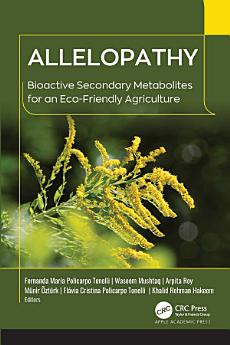Allelopathy: Bioactive Secondary Metabolites for an Eco-Friendly Agriculture
About this ebook
A combination of review and research chapters written by experts from around the globe, this volume reviews synthetic pesticides and the environmental pollution associated with them and also looks at allelochemicals as useful bioactive secondary metabolites. It discusses allelopathy induction in crops by natural selection, the main pathways involved in allelochemical production, and plant breeding in allelopathy. The volume also considers the theme of allelopathy and agricultural sustainability, covering plant-based anthelmintic as a new trend to combat helminth infections, the role of microorganisms, the application of allelochemicals against phytopathogens, the role of nanoparticles on fenugreek growth, biotic and salinity stress alleviation in fenugreek, and more. It also reviews genetic engineering approaches to allelopathy. Several chapters discuss the allelopathic potential of specific crops, such as Leucaena leucocephala, Smilax brasiliensis Sprengel (Smilacaceae), and Solanum lycocarpum A. St. -Hil. (Solanaceae).
Offering a valuable overview of allelochemicals as important eco-friendly tools for sustainable agriculture, this volume provides useful information for research scientists, agricultural and botany professionals, as well as faculty and students in the fields of allelopathy, environmental sciences, agriculture, and biotechnology.
About the author
Fernanda Maria Policarpo Tonelli, PhD, is an Assistant Professor at Federal University of São João del Rei, Brazil. Specializing in biotechnology/molecular biology, she has been studying nanomaterials applications in plants and the allelopathic potential of secondary metabolites, resulting in several granted patents. She has published books, book chapters, and scientific articles. She has been recognized with various awards, including For Women in Science Brazil (awarded by L'Oreal Brasil, UNESCO in Brazil, and Brazilian Academy of Sciences) and Under 30 Brazil (Forbes).
Waseem Mushtaq, PhD, is a postdoctoral researcher at Liege University, Belgium, focusing on weed management through the application of allelopathy, green chemistry, and omics technology. Dr Mushtaq has published several book chapters and numerous research papers in journals of national and international repute. He co-authored the book Allelopathy: Potential for Green Agriculture.
Arpita Roy, PhD, is an Assistant Professor in the School of Engineering and Technology at Sharda University, India. Her areas of interest include plant biotechnology, environmental biotechnology, green nanoparticle synthesis, and microbiology. She has published peer-reviewed papers as well as several books, and has presented papers at national and international conferences. She has been listed in the top 2% of scientists in the world (per Stanford University and Elsevier for 2022, 2023, and 2024.
Münir Öztürk, PhD, DSc, is Vice President of the Islamic World Academy of Sciences. He was formerly Chairman of the Botany Department and Founding Director of the Centre for Environmental Studies at Ege University, Turkey. He was also a consultant fellow at the Faculty of Forestry at the Universiti Putra Malaysia and a distinguished visiting scientist at the International Center for Chemical and Biological Sciences at Karachi University, Pakistan. He has published many books, book chapters, and papers in journals.
Flávia Cristina Policarpo Tonelli is a PhD student, currently researching bioactive phytochemicals present in the natural product green propolis. She has published four scientific articles and 15 book chapters. She has served as a reviewer for reputed journals.
Khalid Rehman Hakeem, PhD, is Professor at King Abdulaziz University, Saudi Arabia, involved with international research with various government organizations. A prolific author and editor, he has published many research papers, book chapters, and edited books. Dr Hakeem serves as a journal editorial board member and reviewer, and an advisory board member of Cambridge Scholars Publishing, UK.





